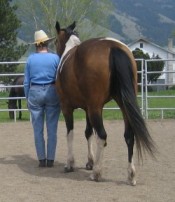
What is the HEAL Model™ of EFPL?
The HEAL Model™ uses a set of interrelated principles for understanding and managing emotion in ourselves and others, that we call “Six Keys to Relationship”. The neural circuits specifically related to social-emotional learning are among the most powerful predictors of whether people can truly thrive. Equine-Facilitated Psychotherapy and Learning (EFPL) activities serve as a living relationship laboratory. At HEAL horses are treated as companion animals in relationships that include working partnership (riding or ground training tasks). Strictly speaking, we cannot control the horse’s emotional state; but we can influence the horse’s emotion and behavior in positive directions by conscientiously managing our own arousal, thought processes and responses (i.e. by careful and educated use of the Keys). The HEAL emphasis on teaching specific skills for management of arousal and development of stress regulation skills distinguish it from other models of EFP or EAP and make this model more suitable for clinical populations, especially those with a background of trauma.
Please click here to watch a video presentation with an in depth look at the HEAL Model of EFPL by Leigh Shambo, MSW, LPCC presented by Horses Helping People MA.
Log in to the video recording for free by entering your name, leigh@humanequinealliance.org as the email address, and Shambo as the password.
Horses Helping People MA also has many other videos available on different aspects of equine assisted activities and therapies so make sure to check them out!
Why Horses are Powerful Partners in Therapy
Horses show remarkable similarity to humans in their limbic (emotional) brain region, and in their patterns of social structure and relating. In emotional and social aspects, relating to horses can serve as a model for the client’s human herd. At HEAL the horse is always a willing partner and is not compelled to perform or to join up. Horses provide honest and immediate feedback about the person’s autonomic and affective state.
Learning from the horse translates readily into human family and social environments. At HEAL we call it “the home run” when positive changes are seen in the clients’ human relationships. Positive benefits from the use of this model can be seen in children and adults with a variety of clinical disorders, and has been demonstrated in HEAL quantitative and qualitative outcome studies.
What is EFPL? An in depth look at Equine-Facilitated Psychotherapy and Learning (EFPL) including video footage of an actual workshop with Leigh Shambo, MSW, LPCC and an interview with Kathleen Barry Ingram, MA.
Types of Equine Therapy Click here to learn how horses are employed in many types of physically and mentally therapeutic activities, for clients of all ages with very different goals.
HEAL’s Six Keys:
1. Body-centered awareness
2. The boundaries ARE the relationship
3. The Divided Self – social incongruence and self-judgment, triggers
4. Yin and Yang. Leadership – setting goals – assertiveness with sensitivity
5. The Art of Imagination in creating positive outcomes
6. The Successful Social Brain: Authenticity and acceptance
How Long Does it Take for EFPL to be Effective?
It is recommended that participants plan for a course of therapy or learning which allows them to experientially grasp HEAL’s “Six Keys”. Many adults feel significant improvement in 8 -12 sessions. Depending on the issues of focus, some participants will find it useful to continue longer. Children typically have a longer duration of therapy since change for them occurs through repetition of positive experiences rather than cognitive insightfulness.
What Disorders Benefit from the HEAL EFP Model™?
Overall, clinical and research evidence indicates that EFPL promotes positive emotional and mental functioning, and that positive benefits are apparent with a wide array of participants. Increased self-esteem, improved integration of cognitive and emotional functions, realistic appraisal of situations and enhanced communication with others provide for improved functioning regardless of diagnostic label (horses don’t recognize labels!). EFPL at HEAL is adapted for various age groups, family or relationship therapy, and level of physical ability. Some interventions are therapeutic and some are educational.
The HEAL model, with its emphasis on “Six Keys to Relationship” has been called “a user’s manual for our emotional operating system”. Being able to practice the core skills of emotional self-regulation and interpersonal emotional regulation are indeed the keys to successful belonging and life satisfaction. These keys are vital to recovery or management of certain mental disorders and periods of extreme stress and life transition.
The HEAL Model™ is particularly well suited to treatment of:
- Trauma-related disorders, including PTSD and certain personality disorders
- Mood disorders, including depression*, bi-polar disorder* and dysthymia
- Anxiety disorders including generalized anxiety, panic disorder and transient anxiety
- Dissociative disorders including dissociative identity disorder**
*EFP may be effectively combined with medication management of some disorders.
**EFP or EFL is sometimes adjunct to therapy with another mental health therapist.
The HEAL Model™ is also effective with:
- Family or Marital therapy, relationship counseling
- Parent-child attachment therapy (riding-based with parental involvement)
- Parenting skills training
- Life skills, assertiveness and social skills training
In general EFP is a recovery-oriented therapy and would not be indicated for crisis situations, actively psychotic conditions and certain other conditions such as persistently dissociative state.
At HEAL we are happy to discuss how EFPL might fit in your program of healing, recovery and growth. Call the HEAL office at 760-873-8980 to schedule a complimentary phone consultation and find out how therapy with EFPL can help you!
